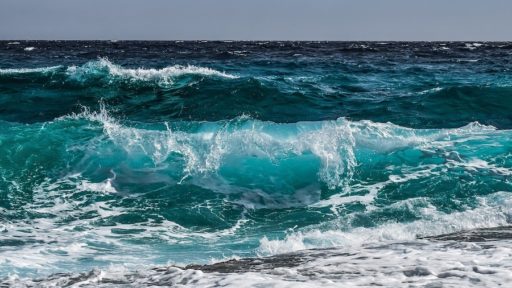Recently my wife and I packed the kids up and drove to the coast by Savannah, Georgia, to attend the wedding of my wife’s lifelong friend. The house where we stayed was a five-minute walk from the beach. There, I thought of the greatest lyric poet of the sea to write in English, and specifically about one of his poems, but before I get to that I want to make a short catalogue of sea (or seashore) poets, like the Catalogue of Ships in the second book of The Iliad.
Speaking of Homer, the Greeks invented both poetry and the sea, as far as Western literary tradition is concerned. This is evident in the fact that we still feel their influence when thinking about either. If you don’t believe me, read Alice Oswald’s most recent book of poetry, Nobody, in which she turns a meditation on The Odyssey into a great ode to the sea.
Modern French has produced at least two great poems of the sea: Eugnène Guillevic’s “The Sea,” spoken in the voice of the ocean, and St.-John Perse’s Amers, usually translated (accurately) as Seamarks but the French contains a pun on the words for bitter and mother. It is infused with feminine imagery and female speakers. One of the strangest, most beautiful, and stupendous poems that I know in any European language. Perse was a diplomat like his poetic forerunner Paul Claudel; his poetry is vatic, at once civilizational and barbarian.
Charlotte Smith resurrected the sonnet form in the later eighteenth century (read her Elegiac Sonnets), anchored the English novel in a sense of place (forget about Thomas Hardy’s novels if not for hers), and then to cap her difficult and brilliant life, she wrote one of the finest topographical poems in English: “Beachy Head.” That’s a cliff on the southern coast of England. Beachy Head is like Wordsworth’s “Excursion” except shorter and better. In any case, there would have been no Wordsworth without Smith.
There is something awesome and symbolic in the loss of ocean-going vessels. As we’ll see in my next post, Thoreau begins his book Cape Cod with the aftermath of such a disaster. Gerard Manley Hopkins’s masterpiece is the long poem, “The Wreck of the Deutschland.” People tend to like his shorter poems, which are a little gruesome and depressing but mostly glorious. “The Wreck of the Deutschland” is the other way around. The shorter lyrics are the beer chaser, but “The Wreck of the Deutschland” is the whiskey.
Since I’m on the topic of intense British Catholic poets whose first two initials are G and M, let me mention George Mackay Brown. He was a Scot—more precisely an Orcadian, like Edwin Muir, whom I last wrote about—also an alcoholic, unmarried lover, and into Vikings. He converted to Catholicism (like Hopkins) in his thirties, though this did not much affect the three qualities just listed. Imagine the Gospel playing out in the wind-whipped, foam-sprayed islands on the threshold of the North Sea and the Norwegian Sea, or then again imagine the Viking world when it was half-pagan, half-Christian, and you’ve got the poetry of G.M. Brown.
Robinson Jeffers’s poetry, tuned into primal nature in all its violence, is an ecological tonic much needed at present. Jeffers was a privileged kid who learned Greek, cut his teeth on tragedy, stole another man’s wife, and with his own hands built a tower out of stone on the California coast at Carmel when it was still a wild place. As with Hopkins, people mostly read his shorter stuff now, if they read him at all. But Jeffers’s best poetry is his longer, more epic work—written in a forceful, loose blank verse—set on the rugged Pacific coast.
Yvor Winters was a masterful poet and sui generis critic. He taught my old poetics mentor, and from Winters’s work directly I learned my high esteem of Robert Bridges’s poetry. Using the now almost impossible form of couplets, Winters wrote two perfect topographical poems, “On a View of Pasadena from the Hills” and “The Slow Pacific Swell.”
Since I spoke of my mentor, I must mention the subject of his first book: Charles Olson’s Maximus Poems, set in Gloucester, Massachusetts, and especially concerned with the fishermen there of Portuguese descent who inspired his Modernist poetry. This is the poetry of place-lore and ventriloquy. I don’t think—to circle back to the beginning of the catalogue—we would have work like Alice Oswald’s Dart or A Sleepwalk on the Severn without the Maximus Poems.
But I said I was going to talk about the greatest poet of the sea…All I ask is a tall ship and a star to steer her by… that’s John Masefield. I don’t have space here to tell you all about Masefield. He was an amazing writer, though forgotten now. His The Everlasting Mercy is a great Christian poem, though I’m not sure in what sense Masefield can be said to have been Christian. He was also an Arthurian poet. The twentieth century will probably go down as the last century to produce Arthurian poetry of quality, and Masefield’s—along with that of David Jones—might be the last of it.
But his best single lyric poem, one of the best lyric poems in English, is “Cargoes.” I thought about this poem down there in Georgia, when I went to watch the dawn every morning while I went through the tai chi form on the beach and freighters churned back and forth in the Savannah channel. The incoming ships are ghostly apparitions (almost too large to founder), looming on the horizon, slowly growing larger until suddenly they tower impossibly close to shore: silent, laden, apocalyptic.
“Cargoes” is one of the most perfect lyric poems in the language. Its mastery covers such techniques as braided alliteration, interwoven duple and triple meters, the usage of dieresis for maximum rhythmic and semantic effect, and parallel construction (each line in a stanza corresponds in syntax and meaning to the lines in the other stanzas occupying the same position). Here are the first two stanzas:
Quinquireme of Nineveh from distant Ophir, Rowing home to haven in sunny Palestine, With a cargo of ivory, And apes and peacocks, Sandalwood, cedarwood, and sweet white wine.
Stately Spanish galleon coming from the Isthmus, Dipping through the Tropics by the palm-green shores, With a cargo of diamonds, Emeralds, amethysts, Topazes, and cinnamon, and gold moidores.
But the real genius of the poem is its sentiment: that is, thought which is also feeling.
When I stood on the beach in Georgia and watched the freighters, the thought that came over and over was that these monstrous emblems of a rapacious global economy could not last much longer and one day something else—or nothing at all—would ply the seas. I think John Masefield felt something similar in his time. I’m willing to accept the outright fantasy of the first two stanzas for the sake of the satirical contrast with the third and last stanza:
Dirty British coaster with a salt-caked smoke stack, Butting through the Channel in the mad March days, With a cargo of Tyne coal, Road-rails, pig-lead, Firewood, iron-ware, and cheap tin trays.
Jonathan Geltner lives in Ann Arbor MI with his wife and two sons. His translation of Paul Claudel’s Five Great Odes is available from Angelico Press and a novel, Absolute Music, is forthcoming from Slant. If you enjoy his posts at Close Reading, check out his new Substack, Romance and Apocalypse, for more frequent and in-depth essays on the places where literature and other arts meet religious ideas and experience.





